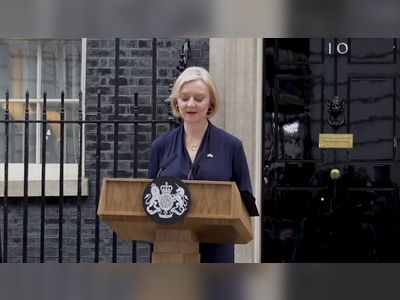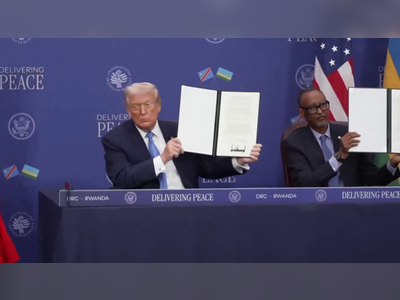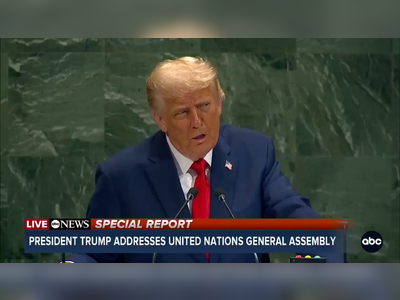
Boris Johnson Accuses UK Government of Changing Israel Policy to Appease Muslim Voters
The former prime minister condemns Labour’s recognition of a Palestinian state and warns of rising antisemitism in Britain
Former UK Prime Minister Boris Johnson has accused the British government of altering its stance on Israel out of fear of alienating Muslim voters.
Speaking in Krakow after receiving the King David Award from the European Jewish Association, Johnson said Britain’s recent recognition of a Palestinian state amounted to “a gift to Hamas” and reflected political cowardice rather than moral principle.
Johnson, who served as prime minister from 2019 to 2022, criticised Labour’s handling of Middle East policy, alleging that it had prioritised electoral interests over Britain’s traditional support for Israel.
“Britain says it stands with Israel, yet it halts arms transfers and rewards Hamas with recognition,” he said.
“I would never have done that.
The government must choose a clear moral line when Israel is under threat.”
He also took aim at the BBC, accusing the broadcaster of spreading anti-Israel sentiment through what he called biased coverage of the Gaza conflict.
“We were told there was famine in Gaza; it wasn’t true.
We were told Israel deliberately targeted hospitals; that wasn’t true either,” he said, adding that some of the rhetoric surrounding Israel revealed a deeper strain of antisemitism in British public life.
Johnson expressed concern about rising antisemitic incidents in London and said that politicians had failed to protect Jewish citizens.
“It’s tragic that Jews now have to worry about their safety,” he said.
“The police should be the ones ensuring that, not the Jewish community itself.” He described chants such as “From the river to the sea, Palestine will be free” as a call for Israel’s destruction and a sign of moral decline in British society.
Despite his criticism, Johnson reaffirmed his support for a two-state solution, though he said it could only happen once Palestinian leaders renounce violence.
“Peace is possible, but they must first stop wanting to destroy Israel,” he said, suggesting that an international or federal authority could oversee the transition.
He blamed Palestinian leadership failures for decades of suffering and mistrust.
Johnson also reflected on his personal connection to Israel, recalling his time working on a kibbutz in the 1980s.
“It was hard work, but it deepened my love for Israel,” he said.
He added that the current situation required “decisive leadership” to confront hate and defend democratic values.
“Britain must stand firm with Israel and not surrender to intimidation.”
Although he ruled out a return to frontline politics, Johnson remains an influential figure within the Conservative Party, which continues to face declining poll numbers.
He expressed confidence in its renewal, saying, “The Conservatives are Britain’s oldest party, nearly 200 years old.
We’ll be back in the centre of the stage.”
Speaking in Krakow after receiving the King David Award from the European Jewish Association, Johnson said Britain’s recent recognition of a Palestinian state amounted to “a gift to Hamas” and reflected political cowardice rather than moral principle.
Johnson, who served as prime minister from 2019 to 2022, criticised Labour’s handling of Middle East policy, alleging that it had prioritised electoral interests over Britain’s traditional support for Israel.
“Britain says it stands with Israel, yet it halts arms transfers and rewards Hamas with recognition,” he said.
“I would never have done that.
The government must choose a clear moral line when Israel is under threat.”
He also took aim at the BBC, accusing the broadcaster of spreading anti-Israel sentiment through what he called biased coverage of the Gaza conflict.
“We were told there was famine in Gaza; it wasn’t true.
We were told Israel deliberately targeted hospitals; that wasn’t true either,” he said, adding that some of the rhetoric surrounding Israel revealed a deeper strain of antisemitism in British public life.
Johnson expressed concern about rising antisemitic incidents in London and said that politicians had failed to protect Jewish citizens.
“It’s tragic that Jews now have to worry about their safety,” he said.
“The police should be the ones ensuring that, not the Jewish community itself.” He described chants such as “From the river to the sea, Palestine will be free” as a call for Israel’s destruction and a sign of moral decline in British society.
Despite his criticism, Johnson reaffirmed his support for a two-state solution, though he said it could only happen once Palestinian leaders renounce violence.
“Peace is possible, but they must first stop wanting to destroy Israel,” he said, suggesting that an international or federal authority could oversee the transition.
He blamed Palestinian leadership failures for decades of suffering and mistrust.
Johnson also reflected on his personal connection to Israel, recalling his time working on a kibbutz in the 1980s.
“It was hard work, but it deepened my love for Israel,” he said.
He added that the current situation required “decisive leadership” to confront hate and defend democratic values.
“Britain must stand firm with Israel and not surrender to intimidation.”
Although he ruled out a return to frontline politics, Johnson remains an influential figure within the Conservative Party, which continues to face declining poll numbers.
He expressed confidence in its renewal, saying, “The Conservatives are Britain’s oldest party, nearly 200 years old.
We’ll be back in the centre of the stage.”









